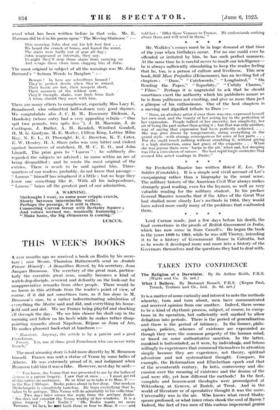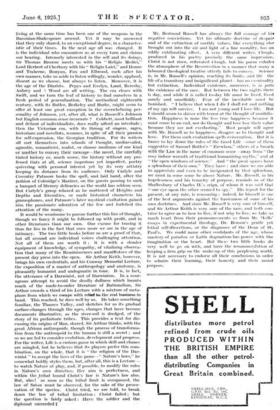TAKEN INTO .CONFIDENCE
What I Believe. By Bertrand Russell, F.R.S. (Kegan Paul, Trench, Trubner and Co., Ltd. 2s. 6d. net.) IT is a matter of some curiosity and interest to note the methods whereby, turn and turn about, men have communicated and received opinion from one another. Indeed, there seems to be a kind of rhythmic process, subject, of course, to excep- tions in its operation, but sufficiently well marked to allow definition into periods. There is the period of generalization and:there- is - the period of intimacy. In the former, philo- sophies,- policies, schemes of existence are expounded as though they were the common property of the: human mind, or based on some authoritative sanction. In the latter, mankind is buttonholed, as it were, by individuals, and listens willingly to experiences that commend themselves to attention simply because they are experience, not theory, spiritual adventure and not systematized thought. Compare, for example, the Reformation and Elizabethan epoch and that of the seventeenth century. In both, controversy and dis- cussion over the meaning of existence and the dooms of the soul were rife, yet how different the methods ! In the first, complete and heaven-sent theologies were promulgated at Wittenberg, at Geneva, at Zurich, at Trent. And in the world of literature or of speculative thought it was the same. Universality was in the air. Who knows what creed Shaker speare.professed, or what inner crises shook the soul of Bacon y Indeed, the fact of two men of this curious impersonal genius living at the same time has been one of the weapons in the Baconian-Shakespeare arsenal. Yet it may be answered that they only shared, to an exceptional degree, in a character- istic of their times. In the next age all was changed. It is the individual who encounters us at every turn and claims our hearing. Intensely interested in the self and its doings, Sir Thomas Browne meets us with his " Religio Medici," Lord Herbert of Cherbury with his " Religio Laici," and Donne and Traherne, Bunyan, Fox and Ellwood, each after his own manner, take us aside to listen willingly, wonder, applaud, dissent as we choose, but always to listen. Moreover, it is the age of the Diarists. Pepys and Evelyn, Laud, Reresby, Aubrey and \ Wood arc all writing. The era closes with Swift, and we turn the leaf of history to find ourselves in a fresh period of generalization. The methodical eighteenth century, with its Butler, Berkeley and Burke, might seem to offer at least one great exception in the overwhelming per- sonality of Johnson, yet, after all, what is Boswell's Johnson but English common sense incarnate ? Cobbett, most brilliant and defiant of individualists, does really afford an interlude'; then the Victorian era, with its throng of singers, sages, historians and "novelists, resumes, in spite of all their passion for self-expression, the Georgian tradition. For its writers all sort themselves into schools of thought, mediaevalist, agnostic, romanticist, realist, or choose mediums of one kind or another to convey their message—the novel, the carefully tinted history or, much worse, the history without any pro- fessed tints at all, science imperious yet imperfect, poetry quivering with personal interest yet by its very artistry keeping its distance from its audience. Only Carlyle and Coventry Patmore 'broke the spell, and laid hand, after the fashion of Coleridge's Mariner, on the guests passing to such a banquet of literary delicacies as the world has seldom seen. But Carlyle's grasp relaxed as he muttered of Heights and Depths and Eternities, or made historical characters his gramophones, and Patmore's later mystical exaltation gained him the passionate adoration of the few and forfeited the attention of the many.
It would be wearisome to pursue further this line of thought, though we fancy it might be followed up with profit, and in other literatures than our own. Our, excuse for tracing it thus far lies in the fact that once more we are in the age of intimacy. The two little books before us are a proof of that, but all around are individual voices challenging attention. Not all of them are worth it ; it is with a slender equipment of knowledge, of sympathy, of vitalizing observa- tion that many of the Reminiscences and manifestoes of the present day press into the open. Sir Arthur Keith, however, brings his own credentials, and his Conway Memorial Lecture, the exposition of a master of anthropology and anatomy, is pleasantly humanist and undogmatic in tone. It is, in fact, the utterance of a Darwinist, not of Darwinism. In a cour- ageous attempt to avoid the deadly dullness which haunts much of the made-to-order literature of Rationalism, Sir Arthur crowds a third of his Lecture with a mixture of meta- phors from which we eseape with relirfUuthe real. business-in hand. This reached, he does well by us. He takes something familiar, the Thames Valley, and sketches for us its gradual surface-changes through the ages, changes that have become documents illustrative, as the river-soil is dredged, of the story of its prehistoric tribes. This provides a text for dis- cussing the origins of Man, shared, Sir Arthur thinks, with the great African anthropoids, though the process of transforma- tion from the anthropoid to the human is still a secret ; and so we are led to consider evolution, development and progress.
For the writer, Life is a curious game in which skill and chance are mingled, but he believes that its players prefer this com- bination, on the whole, that it is " the religion of the Dar- winist to accept the laws of the game—" Nature's laws," he somewhat boldly styles them, but, after all, this is a Lecture— to watch Nature at play, and, if possible, to modify the rules in Nature's own direction. Her aim is perfectness, and within the tribal bound Christ's law is Nature's law also.
But, alas ! as soon as the tribal limit is overpassed, the law of Satan must be observed, for the sake of the preser- vation of the species. Christ tried, we are told, to break down the 'law of tribal limitation : Christ failed ; but the question is fairly' asked : Have the soldier and the diplomat succeeded • Mr. Bertrand Russell has always the full courage of his negative convictions. Yet his ultimate doctrine of despair and of the extinction of earthly values, like everything else brought out into the air and light of a fine morality, has an oddly exhilarating. effect. A very different writer, Clough, produced in his poetry_ precisely the same impression. Christ is not -risen, reiterated Clough, but his poem exhales the atmosphere of the Resurrection in a manner that many a laboured theological treatise utterly fails to convey. Science is, in Mr. Russell's opinion, reaching its limits, and life - the life of a transitory and insignificant planet—has no eventuality but extinction. Individual existence, moreover, is in petto the existence of the race. But between the two nights there is day, and while it is called to-day life must be lived, lived sanely and unselfishly. Fear of the inevitable must be banished. " I believe that when I die I shall rot and nothing of my ego will survive. I am not young and I love life. But I should scorn to shiver with terror at the thought of annihila tion. Happiness is none the less true happiness because it must come to an end, nor do thought and love lose their value because they are not everlasting." Most people will agree with Mr. Russell as to happiness, disagree as to thought and love. For them such evaluation spells evisceration. But it is brave to lay down the roles of the Good Life—some of them suggestive of Samuel Butler's " Erewhoni" others of a breach with the Law in the name of common sense--away from " the cosy indoor warmth of traditional humanizing myths," and at " the open windows of science." And " the great spaces have a splendour of their own." They have ; and since we are able to appreciate and even to be invigorated by that splendour, we must in some sense be above Nature. Mr. Russell, in his hopelessness and his tenacity of purpose, reminds us of the Shaftesbury of Charles II.'s reign, of whom it was said that " one eye upon the other seemed to spy." His report for the present, at any rate, is reassuring ; indeed, he himself is one of the best arguments against the barrenness of some of his own doctrines. And since Mr. Russell is.very sure of himself, and Sir Arthur Keith is very sure of the race, and both con- trive to agree as to how to live, if not why to live, we take as much heart from their pronouncements as from Mr. It-ells' essays in experimental theology, Dr. Benson's gentle yet lethal self-dissections, or the diagnoses of the Dean of St. Paul's. We could name other confidants of the age, whose mastery of paradox or Latin dogmatism has power with the imagination Or the. heart. But tias2 two little books do very well to go on with, and have the recommendation of keeping a firm grip on the make-up of this perplexing world. It is not necessary to endorse all their conclusions in -order to admire their learning, their honesty and their moral purpose.















































 Previous page
Previous page